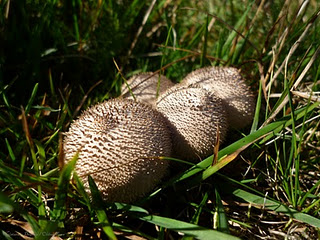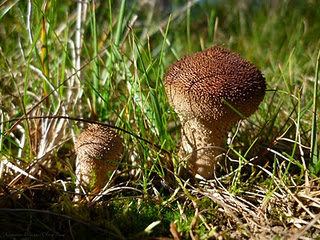Lycoperdon perlatum (nigrescens)?
Za młodu – dopóki biała w środku – jest jadalna, a o działaniu poniżej…
„Several steroid derivatives have been isolated and identified from fruit bodies of L. perlatum, including (S)-23-hydroxylanostrol, ergosterol α-endoperoxide, ergosterol 9,11-dehydroendoperoxide and (23E)-lanosta-8,23-dien-3β,25-diol. The compounds 3-octanone, 1-octen-3-ol, and (Z)-3-octen-1-ol are the predominant components of the volatile chemicals that give the puffball its odor and flavor. [...] Extracts of the puffball contain relatively high levels of antimicrobial activity against the human pathogenic bacteria Bacillus subtilis, Staphylococcus aureus, Escherichia coli, and Pseudomonas aeruginosa, with an efficiency comparable to that of ampicillin. [...] These results corroborate an earlier study that additionally reported antibacterial activity against Salmonella typhimurium, Streptococcus pyogenes, and Mycobacterium smegmatis. [...] Extracts of the puffball have also been reported to have antifungal activity against Candida albicans, Candida tropicalis, Aspergillus fumigatus, Alternaria solani, Botrytis cinerea, and Verticillium dahliae.” (http://en.wikipedia.org/wiki/Lycoperdon_perlatum)
A to brzmi już zupełnie sensacyjnie:
| Nutritional value per 100 g (3.5 oz) | |
|---|---|
| Energy | 1,845.5 kJ (441.1 kcal) |
| Carbohydrates | 42 g |
| Fat | 10.6 g |
| Protein | 44.9 g |
| Iron | 5.5 mg (42%) |
| Manganese | 0.6 mg (29%) |
| Zinc | 0.5 mg (5%) |
| Percentages are relative to US recommendationsfor adults. Source: USDA Nutrient database |
|
Źródło: Lycoperdon perlatum (nigrescens)?


